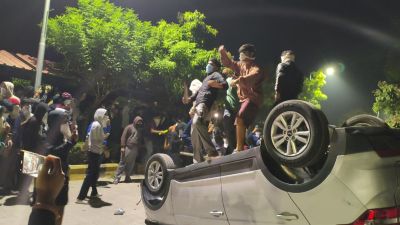German thinking in an Indian heart,and car that drives itself
One week is hardly enough time to understand a foreign country and its way of life
One week is hardly enough time to understand a foreign country and its way of life. Still,a week-long visit to Germany provided a wide spectrum of some interesting encounters. Here are a few snapshots:
Autonomous automobile
A small artificial intelligence and robotics laboratory at Berlins Freie University,which started with creating soccer robots,is chasing Google in the race to develop the first commercially usable autonomous or self-driving cars. After extensive trials at the out-of-use Tempelhof airport,the driverless car (disingenuously called Made in Germany) from AutoNOMOS Labs has over the last few months being plying on the streets following clearance from Berlins local authorities. The 20-man group at Freie University,headed by Prof Raul Rojas,has a 20-year time-frame for commercialisation of the car against Googles more ambitious one of eight years,says AutoNOMOS commercial project co-ordinator Patrick Vogel.
The car deploys multiple radars,sensors and cameras to capture and process the real-time environment and mashes it up with digital mapping and GPS technology to navigate the prototype Volkswagen car around pre-programmed routes. The car,for which the government provided 2.1 million euros as funding in 2009,is meant to be better than a human being when it comes to following the rules completely and does not look like a robot,says Vogel.
Autonomos is also working on spinoff versions that can be driven by the thoughts of a person. Some of the technology for the brain-driven car is being tested on a special wheelchair where a person seated decides where the chair will go on the basis of programmed thoughts.
Made in India
The early MTV generation in India will remember the chart-topping number I am an Indian with a reggae rhythm from 1996. Part of the album Made in India,the song was by the Noble Savages band featuring brother and sister Cyrus and Shirin Valentine.
Shirin is today among the best known Indian-origin Germans. A music producer,promoter,performer and TV presenter,she says her heart is Indian but her thinking is German. Her father,a Punjabi Christian,and mother,a Parsi from Mumbai,met in Munich during the 1976 Olympics when they were new immigrants,speaking hardly any German. Her father first worked as a janitor at the Olympic Stadium. The couple later moved on to work at the Indian embassy.
The first time I was in India was when I was 11. I was thrown back by the smells,noise and crowds in Mumbai. I wanted to go back, Shirin says. I later grew to understand India and my Indian identity better.
Her musical avatar is today in a band called Shes All That with a rock on electronic sound,as she describes it. A journalist by training,she runs a music production agency,Das Musiknetzwerk,and organises an annual contest for bands,Toys2Masters.
Geeks to politicians
Last year,Germany witnessed its own version of the Internet revolution. The Pirate Party,comprising largely computer geeks and born on the Internet in protest against violation of online privacy and data protection norms,hit the jackpot in the elections to the Berlin city council. All 15 candidates nominated by the Pirate Party found seats after the party got more than five per cent of the votes. The party,some of whose members have overlapping affiliations with hackers collectives,surprised many people in Germany by translating their fight for greater Internet freedom into a political victory. It is the first protest party to emerge in Germany since the Green Party in the 1980s. It is also standing for direct democracy and legalisation of soft drugs.
Shrinking cities
A story you hear often these days is about Germanys shrinking small cities in the wake of migration to bigger ones. Wuppertal,close to Cologne and the only city in the world with a hanging train (over 100 years old),is a prime example. The erosion of small and medium industries by the growth of bigger German industry and Chinese imports has reduced its population,once nearly 400,000,to 340,000 in 15 years. In small districts of Wuppertal like Olberg,where tools used to be handmade and textiles handwoven,large blocks of homes now lie vacant.
Residents have now launched initiatives with the funding of state authorities and the European Union to try and put empty homes to community use. The Zwischen Nutzungs Agentur Wuppertal initiative has received 60,000 euros for five years for a pilot project to use empty properties for uses such as childrens craft workshops and artists studios. In another initiative,local residents have started a company to buy over empty properties and put them to profitable use.
Those staying back in the smaller cities are the ones who are immobile like single mothers,the elderly,migrants and children, says Rolf Martin from the Zwischen Nutzungs Agentur Wuppertal. Cities wont invest money in their futures. People have to organise themselves. Keeping a district alive is a social sign that an area is alive,at least as a model for future cities.
Rudiger Bleck,a town planner in the city council,feels things are changing with funds from the EU and the local state government.
Goodbye reactors
Following Fukushima,Germany has settled on 2022 as the year when the last of its 17 nuclear reactors will shut down,ending a nearly five-decade tryst with nuclear energy. Yet,groups like Anti Atom Bonn still organise weekly protests for fear that there could be a rethink.
Germany is expected to continue to have nuclear supplies from countries like France. The hole left by the shutdown is not likely to be filled by renewable energy sources by 2022. Nuclear energy contributes 23 per cent of the total electricity produced in Germany and renewable energy 20 per cent.
Germany is also grappling with the issue of a site for disposal of its nuclear waste. It is about a safety culture,its about having a lot of qualified people who act responsibly, says Sven Dokter,a media representative for Global Safety Research,an independent adviser to the government.
(The correspondent was in Germany on a journalism exchange programme,Shifting Perspectives,organised by the Federal Government of Germany,as part of the Infinite Opportunities agreement between the Indian and German governments)



- 01
- 02
- 03
- 04
- 05




























